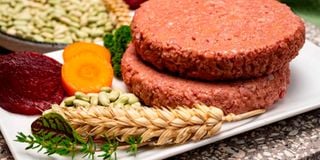How to detect and address protein deficiency in your diet

A swollen abdomen is a common symptom among malnourished children with kwashiorkor.
What you need to know:
- Lack of protein leads to loss of muscle mass.
- A protein deficiency can lead to a build-up of fats in the liver, which eventually leads to fatty liver disease.
- A protein deficiency can lead to feelings of weakness and fatigue.
Proteins are one of the most important nutrients for the body. Their functions include growth and development, building of tissues, hormone production, enzymes, immunity, nerve function, and energy production, just to name a few.
Meat, eggs, dairy products, grains, legumes, nuts, fruits, vegetables, and even unhealthy fast foods contain a significant amount of protein. Therefore, protein deficiency is rare for people that get regular meals. There are, however, still many people for whom protein deficiency is a problem.
People at risk of protein deficiency
- People, especially children, don't get regular meals in sufficient amounts.
- People with gastrointestinal disorders such as celiac disease, inflammatory bowel disease, or chronic pancreatitis interfere with protein absorption.
- People with chronic illnesses such as cancer, kidney disease, or liver disease. The patients have difficulty eating, loss of appetite, and digestion problems either from the diseases or medication. This interferes with the supply of proteins and other nutrients.
- Elderly people. As you age, your body needs more protein, but our ability to absorb protein decreases. Generally, elderly people also consume low amounts of food.
- Vegans, vegetarians, and people with eating disorders are also advised to deliberately include protein-rich foods.
Signs and symptoms of protein deficiency
The symptoms of protein deficiency vary from one person to another depending on factors such as the severity of the deficiency, age, and general health of the individual before the deficiency. The most common signs that a person has low levels of proteins include:
Swelling of the abdomen, and other parts
A swollen abdomen is a common symptom among malnourished children with kwashiorkor. Other parts such as arms, legs, and feet may also swell. The swelling, also known as edema, is caused by excessive retention of fluids in the tissues in the affected body parts. The protein albumin is essential in maintaining fluid balance. The high fluid retention is, therefore, a sign of inadequate albumin in the blood.
Muscle wasting and weakness
Lack of protein leads to loss of muscle mass. This is because protein is essential for the growth and repair of muscle tissues. Protein deficiency can cause muscle wasting, which is characterised by weakness and shrinkage in muscle size.
Sarcopenia, which is age-related loss of skeletal muscle mass, is a common condition among the elderly. It is also a sign of low levels of protein in the body.
Fatty liver
Protein plays an important role in the metabolism of fats. A protein deficiency can lead to a build-up of fats in the liver, which eventually leads to fatty liver disease.
People with protein deficiency are also at a higher risk of developing other chronic diseases such as diabetes, heart disease, and osteoporosis.
Weakness and fatigue
Protein is essential for the production of energy in the body. A protein deficiency can lead to feelings of weakness and fatigue. A protein deficiency can also cause anaemia, which is a condition characterized by low levels of haemoglobin in the blood. The anaemia can cause fatigue and weakness. The fatigue and weakness may also be attributed to muscle wasting which is caused by protein deficiency.
A weak immune system
Protein is essential for the formation of antibodies, which are responsible for fighting infections. A protein deficiency can lead to a weakened immune system, making an individual more susceptible to infections and diseases. It also takes longer for people with low protein in their bodies to heal wounds and illnesses.
Weak bones
Every cell in your body contains protein, and this applies to bones too. A protein deficiency hinders the maintenance of bone structure making them weak and brittle. In elderly people, protein deficiency can also cause osteoporosis, which is a condition characterised by porous and fragile bones.
Unhealthy nails, hair, and skin
Keratin, a major component of nails, hair, and skin, is a protein. There are also other types of proteins involved in the growth and maintenance of these three. A protein deficiency can therefore lead to unhealthy nails, hair, and skin. The nails may become brittle and break easily. The hair may become thin and fall out easily. The skin may become dry, flaky, and prone to infections. In fact, all these are tell-tale signs of kwashiorkor in children.
How to address protein deficiency
The number one line of addressing protein deficiency is increasing protein intake in the diet. This can be done by eating more protein-rich foods such as meat, fish, poultry, eggs, milk, and cheese. Beans, nuts, and seeds are also good sources of protein. It is also important to eat a variety of protein-rich foods to get all the essential amino acids. In severe cases, such as kwashiorkor, you should get a nutrition plan from a doctor or nutritionist for a healthy and steady recovery.


